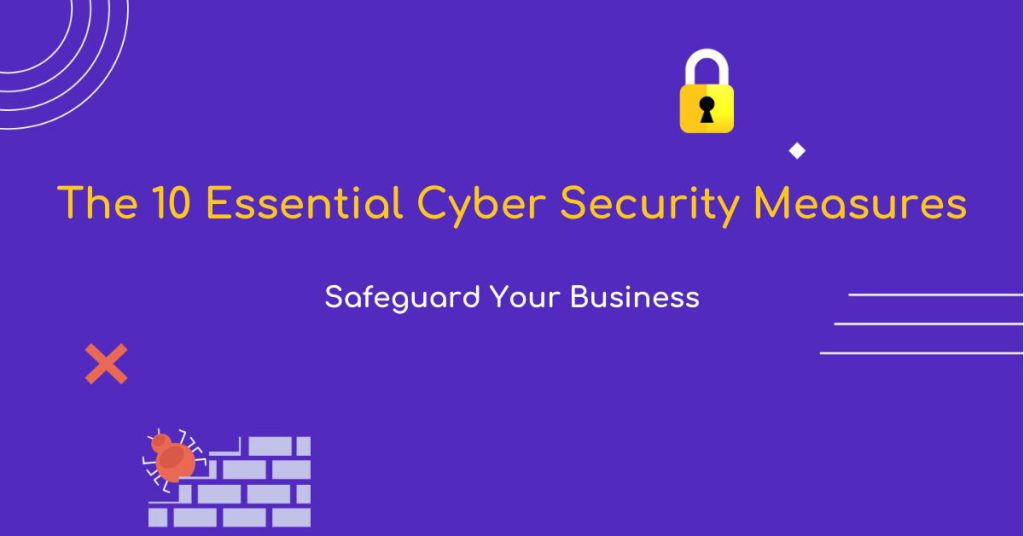In today’s digital era, implementing strong cyber security measures is not just an option, but an absolute necessity for organizations. Cyber-attacks are the main challenge that a modern business has to deal with. As technology becomes an integral part of business, security and protection of sensitive data and operations comes to the forefront.
In this article, we’ll get to know the extent to which cyberattacks are affecting businesses today, and delve into 10 critical cyber security measures that every organization should adopt to adequately protect their assets and confidential information!
More specifically, we will address:
- What is cyber security? [Definition]
- Why is cyber security such a challenge? [Statistics]
- Guide: The 10 Security Measures you should adopt for your business.
- Protect your business with NUS Solutions!
What is Cyber Security?
The term “cyber security” refers to the set of practices aimed at protecting information systems, data, and digital networks from unauthorized access and malware attacks.
Cyber security can be divided into the following main categories:
- Network Security: the practice of securing a computer network from intruders.
- Application Security: the process of keeping software and devices free from threats.
- Information Security: protecting the integrity and privacy of data, both in storage and in transit.
- Operational Security: the processes and decisions to protect data assets.
- Disaster recovery & business continuity: the way an organization responds to a cyber-attack incident or any other event that causes data loss.
- End-User education: addressing the most unpredictable factor in cyber security, namely the human being. Anyone can accidentally introduce a virus into a secure system by not following good security practices.
Why is Cyber Security so important today?
Technology is evolving dynamically and organizations are increasingly relying on digital systems. The urgent need for strong cyber security measures is demonstrated by the growing number of data breaches, the financial losses suffered by businesses and the increasing activity of hackers.
One of the most common forms of online fraud is Ransomware, the ‘nightmare’ of businesses, which we have discussed in a previous article. Stay tuned for our next articles, as we will analyze even more forms of cyber attacks!
For now, let’s start talking in data:
- In 2022, 493.33 million Ransomware attacks were detected by global organizations. (source: Statista)
- Phising remains the most common cyber attack, with nearly 3.4 billion daily spam emails. (source: Cisco)
- The average global data breach cost was $4.35 million in 2022. (source: IBM)
These statistics demonstrate the urgent need to adequately equip SMEs, which are particularly vulnerable to these attacks due to their limited resources and lack of cybersecurity expertise.
How can you safeguard your organization?
1. Firewalls
The main role of Firewalls is to control incoming and outgoing traffic. This means that firewalls can analyze data traffic entering or leaving a network and decide whether that traffic should be allowed or denied based on predefined rules. This helps mitigate attacks such as DDoS (Denial of Service) attacks and prevent intrusion by malware.
2. Regular Updates and Patch Management
Maintaining an enterprise’s cyber security requires the adoption of effective regular updates and the proper management of code updates. This practice ensures that your infrastructure remains resilient against known vulnerabilities and cyber threats.
3. Strong Authentication
Enforce multi-factor authentication (MFA) for access to critical systems and data, adding an extra layer of security beyond passwords. This system requires the presentation of two or more identifying factors before access is allowed. These factors include something the user knows (such as a password), something the user has (such as a smartphone to receive a confirmation code via SMS), and something the user is (such as biometric identification, such as fingerprint or facial recognition).
4. Employee Training and Awareness
Train your employees in cybersecurity best practices, including how to identify phishing emails, avoid suspicious websites, and manage sensitive information securely.
5. Data Encryption
Encrypt sensitive data both at rest, i.e. during storage, and in transit, to ensure that even if data is intercepted, it will remain unreadable without the proper decryption keys.
6. Regular Backups
Back up critical data and systems frequently and store them in a secure off-site location to enable data recovery in the event of a cyber security incident.
7. Access Control and Privilege Management
Apply the microsoft Principle of Least Privilege (POLP) by providing users with only the access required for their roles. Regularly audit and revoke unnecessary access.
8. Incident Response Plan
Develop and regularly update a comprehensive incident response plan that outlines the steps to take in the event of a security breach or incident. This helps mitigate damage and facilitates rapid recovery. By doing so, you ensure that access to sensitive systems and data is controlled and limited to the necessary minimum, reducing the risk of unwanted breaches and attacks.
9. Vulnerability Scanning and Penetration Testing
Perform regular vulnerability assessments and Penetration Testing to identify weaknesses in your network and applications, allowing you to proactively address them.
10. Intrusion Detection and Prevention Systems (IDPS)
Intrusion Detection and Prevention Systems (IDPS) represent an important tool in cyber security. IDPS are advanced systems that monitor network or system traffic and detect any irregularities or threats, providing an extra layer of security.
Conclusion: Cyber Security as the No. 1 priority of modern businesses!
In conclusion, securing your organization’s digital assets is a critical aspect of maintaining a competitive edge and safeguarding your reputation. By adopting the ten crucial cyber security measures mentioned in this article, you can significantly enhance your organization’s resilience against cyber threats.
NUS experts are committed to providing the expertise and tailored solutions you need to establish a robust and secure IT environment. Trust us as your dedicated IT partner, and together, we can navigate the dynamic landscape of cyber security with confidence.
